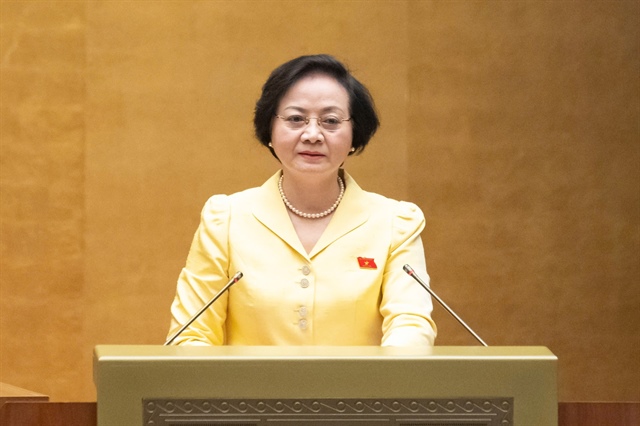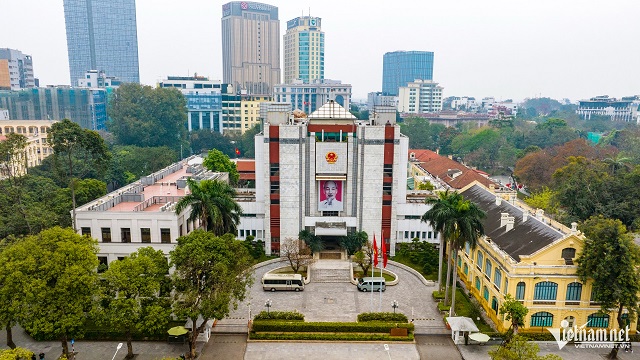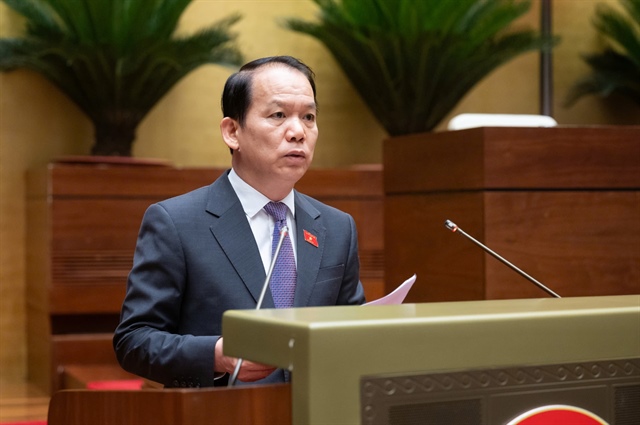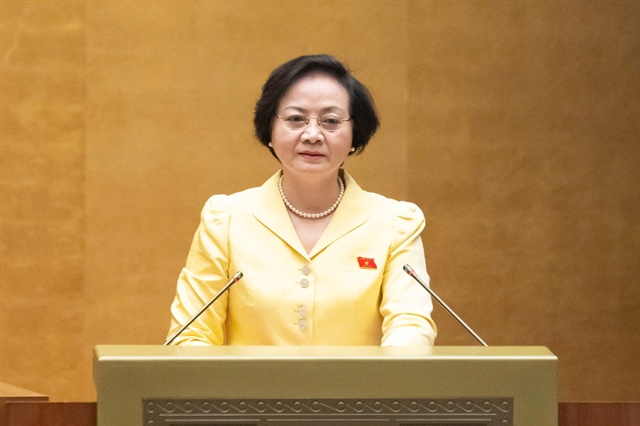The current draft of the Local Government Organization Law consists of 50 articles, while the new draft law is expected to comprise 54 articles. Among these, 42 articles are proposed to be amended and supplemented to align with the transformation of the local government model from a three-tier to a two-tier structure, excluding the district level.
The provincial level retains the current regulations, encompassing provinces and cities. Meanwhile, the communal-level administrative units (ĐVHC) are reorganized to establish the new communal level, consisting of communes, wards, and special districts (located in archipelagos) to conform to the new organizational model. The administrative-economic special units remain under the jurisdiction of the National Assembly, as per existing regulations.
 Minister of Home Affairs, Pham Thi Thanh Tra, presents the draft law. Source: National Assembly |
The authority to define criteria for classifying ĐVHC is proposed to be transferred from the Standing Committee to the Government. This amendment aligns with the Prime Minister’s authority to decide on the classification of provincial-level administrative units and the Chair of the People’s Committee’s authority at the provincial level to determine the classification of communal-level administrative units.
Both the provincial and communal levels of local governments will establish People’s Councils and People’s Committees to ensure a unified and seamless administrative system from the central to the communal level.
Regarding the organization of local governments, the Government proposes that the provincial level remains largely unchanged, except for an increase in the number of People’s Council delegates to accommodate merged provinces and cities. For the communal level, the People’s Committee can establish specialized agencies, other administrative organizations, or assign specialized civil servant positions to provide advice and management in various sectors and fields, suiting the new scale of the communes and wards.
The Government also recommends amending the provisions to enhance decentralization and delegation of tasks and powers to the provincial and communal levels.
In addition to their current tasks and powers, the provincial level will be granted additional authority to promote decentralization from the central level, especially in issuing mechanisms and policies related to planning, finance, budgeting, and investment in their respective localities.

Headquarters of Hanoi People’s Committee. Source: Hoang Ha
|
The communal level will be entrusted with the tasks and powers of both the current district and communal levels of local governments. They will be authorized to issue legal documents to decide on matters within their jurisdiction and scope of management in the new communes and wards.
Notably, the Government proposes adding provisions to delineate the authority of local governments. These provisions ensure that the delegation of tasks, powers, and the definition of roles for local governments and their agencies in legal documents align with this law, effectively controlling state power.
In exceptional cases, the People’s Committee and the Chair of the People’s Committee at the provincial level can directly oversee and manage matters falling within the jurisdiction of specialized agencies or other administrative organizations under their purview, as well as the People’s Committee and the Chair of the People’s Committee at the communal level.”
Mechanisms to strengthen the role and responsibility of the communal-level government are necessary
The Chairman of the Committee for Law and Justice, Hoang Thanh Tung, expressed the Committee’s agreement with the proposal to organize administrative units into two levels.
Regarding the special districts as administrative units in archipelagos, the Committee concurred with the policy. For island communes belonging to district-level administrative units but not located in archipelagos, the Committee requested the Government to continue reviewing and proposing appropriate arrangements. The Committee also emphasized the need to carefully consider amendments and supplements to relevant regulations to ensure the rights and interests of citizens, officials, and public employees after the rearrangement of administrative units.

Chairman of the Committee for Law and Justice, Hoang Thanh Tung, presents the review. Source: National Assembly |
With the absence of the district level, many tasks and powers of the district-level local governments will be transferred to the communal level, and the expansion of the scale of communal-level units will significantly increase their workload. The Committee for Law and Justice acknowledged that this represents a significant change, and the capacity of the communal-level government machinery is not yet uniform and needs time to be consolidated and improved. Therefore, mechanisms to strengthen the role and responsibility of the communal-level government are essential.
Provincial-level governments must monitor, supervise, and provide timely support and solutions if one or several communal-level governments lack the capacity to perform or effectively execute their assigned tasks and powers. This ensures the efficiency and effectiveness of the administrative system and guarantees the timely resolution of issues for citizens and businesses within the locality.
Tran Thuong
– 10:32 05/07/2025
The Power of Effective Capital Management: A Vice-Premier’s Directive for Optimal State Capital Stewardship
Vice Prime Minister Ho Duc Phoc emphasized the importance of effective state capital management, underscoring the principle that “with capital comes management.”
The Challenges of Implementing Decentralization and Devolution of Power in Ho Chi Minh City
Vice Chairman of the Ho Chi Minh City People’s Committee Duong Ngoc Hai shared his experience on implementing decentralization and delegation of authority in the city at the national online conference on reviewing the performance of the home affairs sector in 2024 and deploying tasks for 2025, held on the morning of December 21.
The City of Ca Mau, After Reorganization, No Longer Has Wards
Cà Mau will have nine wards and seven communes after the reorganization, a reduction of two wards from the current structure.





















